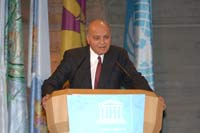| |
 |
 |
|
 |
 |
|
 |
 |
|
 |
| François Houtart (Belgium) and Abdul Sattar Edhi (Pakistan) to share 2009 UNESCO-Madanjeet Singh Prize for the Promotion of Tolerance and Non-Violence |
 |
|
 |
 News 2 of 54
News 2 of 54

 The Director-General of UNESCO, Koïchiro Matsuura, has decided, following the unanimous recommendation of the International Jury, to award the 2009 UNESCO-Madanjeet Singh Prize for the Promotion of Tolerance and Non-Violence to the following two laureates, dividing the $100,000 amount of the Prize equally between them: The Director-General of UNESCO, Koïchiro Matsuura, has decided, following the unanimous recommendation of the International Jury, to award the 2009 UNESCO-Madanjeet Singh Prize for the Promotion of Tolerance and Non-Violence to the following two laureates, dividing the $100,000 amount of the Prize equally between them:
François Houtart (Belgium) for his life-long commitment to world peace, intercultural dialogue, human rights and the promotion of tolerance, and in recognition of his outstanding efforts to advance the cause of social justice in the world
Abdul Sattar Edhi ((Pakistan) for his life-long efforts to ameliorate the conditions of the most disadvantaged groups in Pakistan and South Asia, and to promote the ideals of human dignity, human rights, mutual respect and tolerance.
Dedicated to advancing the spirit of tolerance in the arts, education, culture, science and communication, the Prize is awarded every two years to individuals or institutions for outstanding contributions to the promotion of tolerance and non-violence.
Mr Houtart is an ardent promoter of North-South cooperation and the founder of the Tri-Continental Centre (CETRI), a non-governmental organization renowned for its work on development issues and in the International Council of the World Social Forum. Known throughout his life as a defender of human rights, he has contributed significantly to the advancement of the inter-faith and inter-cultural dialogue. As a noted sociologist of religions and theology, he has authored numerous publications and given lectures in over 100 universities around the world. An honorary member of the Academy of Sciences of Vietnam and Cuba and a member of the Commission on Struggle against Racism of the Ecumenical Council of the Churches, he has served as President of the Committee for Human Rights in Burundi (1986-1992); founder and director of the international review “Social Compass” (1960-1990); and President of the International League for People’s Rights (2003-2008).
Dr. Edhi is one of the most active philanthropists in Pakistan through his Edhi Foundation, which he created in 1957. A non-profit social welfare programme with over 300 centres across Pakistan, the foundation provides the needy with medical aid, family planning, emergency assistance and education. It sets up maternity homes, mental asylums, homes for the physically handicapped, blood banks and orphanages, among other services. Branches in several other countries (Afghanistan, Bangladesh, Ethiopia etc.) bring relief to refugees and other victims of strife and natural disasters. Dr Edhi is renowned for his active stand against extremism and his support of human rights as well as for his humanitarian efforts.
Mr Matsuura also decided to award two Honorary Mentions to:
The St. Petersburg Government Programme on Tolerance (Russian Federation) for its constructive efforts to inculcate mutual respect and tolerance in a multi-cultural and multi-ethnic society and to prevent and eradicate all forms of discrimination;
The International Slavery Museum in Liverpool (United Kingdom of Great Britain and Northern Ireland) for its efforts to commemorate the lives and deaths of millions of enslaved Africans, and for its work to fight against legacies of slavery such as racism, discrimination, inequalities, injustice and exploitation, as well as against contemporary forms of slavery.
The award of honorary mentions to the St. Petersburg Government Programme on Tolerance and the International Slavery Museum in Liverpool acknowledges their contribution to the promotion of the ideals of human dignity, solidarity and mutual respect in multi-cultural, multi-confessional and multi-ethnic societies. The numerous activities undertaken by the two winners are fully in line with UNESCO’s goals and programmes and serve as an encouragement for similar activities in other countries.
The UNESCO-Madanjeet Singh Prize was created in 1995 on the occasion of the 125th anniversary of the birth of the Mahatma Gandhi, thanks to the generosity of the Indian writer and diplomat Madanjeet Singh, who is also a UNESCO Goodwill Ambassador.
The International Jury of the UNESCO-Madanjeet Singh Prize is composed of Ioanna Kuçuradi (Turkey), Chairperson, Maurice Glele Ahanhanzo (Benin), Vice-Chairperson, Kamal Hossain (Bangladesh), Masateru Nakagawa (Japan) and Mokhtar Taleb-Bendiab (Algeria).
The Prize-giving ceremony will be held on International Day for Tolerance, celebrated every year on 16 November.
Photo: Indian writer and diplomat Madanjeet Singh © UNESCO/Niamh Burke
Related Links
|
|
|
| Author(s) |
UNESCOPRESS Press release No. 2009-128 |
| Publication Date |
20-10-2009 |
| Source |
UNESCOPRESS |
|
|
|
|
|
|
|
 |
 |
 Email this page Email this page  Printable version Printable version
|
 |
|
|


